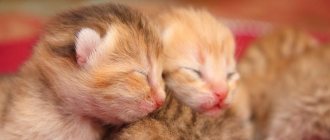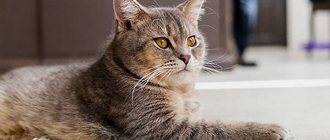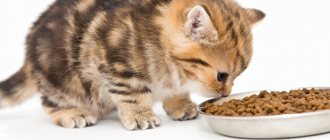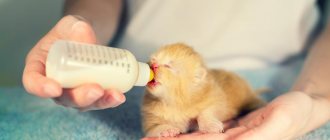The cat may appear suddenly. A homeless kitten will rush to you with a plaintive meow, your grandmother will leave the pet as an “inheritance” or your children will give it as a gift. But what if you have the opportunity to choose your own pet, your ideal companion for many years to come?
It is possible to make the right choice if you approach the issue consistently and with a cool head. How can this be, you exclaim indignantly, because you need to choose a kitten not with your mind, but with your heart! Okay, but where to choose - in a shelter, on an advertisement site, in an elite nursery? What breed of kittens should I look for, and do I need a breed at all? Among the kittens that are as similar as two peas in a pod, would you prefer a girl or a boy?
There are so many questions that make your head spin, especially if this is your first cat. We will deal with each point in order so that you can make a choice with a light heart. Think about what you expect from your pet. Then it will be clear which kitten is better to take in accordance with these requests.
Author of the article: Olga Shiltsova, practicing veterinarian, author of the books “Dachshund of Fate” and “Tails of Fortune”
Origin matters: whether to buy a purebred kitten
Mixed-breed cats are great. A variety of colors and coat types, high intelligence and vitality - all this is inherent in outbred animals. A barn cat can grow larger than a Maine Coon, fluffier than a Persian, and nobler than any breed. Except that there are no sphinxes among them yet. Then does it make sense to buy a kitten from an elite cattery if it is possible to adopt a pet for free? In addition, it is outbred kittens that usually need a home and caring hands.
If you want to save someone's life, love all cats in general, or just want a cat of a certain color (pure white or black cat, calico cat), then a mongrel pet is a great option.
What to do when you pick up a kitten from the street
However, a yard kitten is a kind of lottery. It is not known what size he will grow, what character traits will appear. This is a real “pig in a poke”, an option for those who believe in fate or are naturally gambling.
If you want predictability, then a purebred cat is perfect. Despite the fact that any animal is an individual with its own characteristics, there are pronounced breed traits: the Cornish Rex is a sociable electric broom, the British is an independent couch potato, the Maine Coon is a good-natured giant, and so on. You know in advance what the pet will look like (breed standards), the object of admiration for all random guests, your pride.
If you want to breed cats, you need to purchase only animals with documents and good exhibition prospects, and not multiply the army of outbred and stray kittens.
Regarding health problems, there is a persistent myth that mestizos supposedly do not get sick. And they say they don’t need vaccinations, and they can even digest nails and live up to 30 years. Whereas purebred animals are sissies and generally genetic freaks, which is why they live on artificial feed at an exorbitant price.
The truth is in the middle. Various cat breeds do have hereditary diseases (polycystic kidney disease in Persians, osteochondrodysplasia in Scottish Folds). But if you buy a kitten from a club, the risk of such problems is minimized. There are breeds of cats, among which there are often long-livers (18-20 years) - for example, Thai, and in native breeds (Siberian, Russian Blue) - health is no less good than that of yard cats.
Tricolor cat
Outbred kittens just as much need vaccinations, parasite treatments, and quality nutrition as their blue-blooded counterparts.
Thus, a purebred kitten from a nursery is not a matter of prestige or a desire to show off. It’s just that such a pet’s appearance and character traits will form a familiar picture: many people keep only Siamese or only British dogs all their lives, unable to change their favorite breed. And if all your life you have dreamed of a huge cat with tufted ears, affectionate, but so wild in appearance - why not buy a Norwegian Forest kitten or Maine Coon.
How and what to feed your baby?
When the kitten is six weeks old, they begin to feed it seven times a day, with special dry food.
Before distributing the cubs to other people, the breeder must tell them how the cubs ate, since a sudden change from one food to another causes dyspepsia in kittens. At 6 weeks the animal is switched to dry kitten food. The number of feedings is 7 times a day and as they grow older, one feeding is eliminated every month. If the cat is purebred, a large selection is offered by Royal Canin, which produces food for Maine Coon, Persian, Siamese, and British babies. Or they are fed with special high-quality food with o, “Pronature”, “Origin”, “Akana”, “No”, “Go”, “Karnilov”, “Nutram”.
A small pet's diet should include boiled boneless fish and liver (no more than 1 meal every 2 weeks), raw frozen meat, cut into small pieces. Steamed meat products are strictly not recommended. Minced meat is undesirable because the baby will not learn to chew. Gluten-free porridges are healthy - rice, buckwheat, oats with the addition of meat ingredients and boiled vegetables. Raw yolk and low-fat cottage cheese can be 1 r. in 7 days. All products should be introduced gradually, in small portions, observing the body's reaction. After a year, an adult cat is given food with the Adult symbol if there are no health problems.
What determines the cost of kittens?
If you decide to buy a purebred pet, then the range of prices for kittens of the same breed will surprise you. Therefore, first of all, you need to decide for what purpose you are buying a cat - as a pet or for participation in exhibitions and breeding.
Officially, purebred kittens are divided into three categories:
- Pat (Pet);
- Breeding;
- Show class (Show).
Show class – the best representatives of the breed, potential exhibition winners and valuable genetic material. These kittens are the most expensive. Taking such a pet for castration is unwise from a financial point of view and sad for the gene pool of the breed.
Most often, kittens of the breeding class are sold - a strong middle class. These cats can participate in breeding because they have no obvious defects and have all the breed qualities.
Pet class are kittens not suitable for breeding. You should find out why. If the defect is the “wrong” color, there is no problem. But if, for example, a kitten’s testicle has not descended into the scrotum, then it will require an expensive castration operation.
The kitten must have a pedigree (4 generations), regardless of what class it belongs to.
Don’t rush to buy a purebred baby at an attractively low price “without documents”, “unscheduled mating”. Most likely, such breeders want money, not improvement of the breed.
A kitten cannot be too cheap if the cat owner purchases high-quality food, gives adults and children vaccinations, visits exhibitions and a veterinarian. Otherwise, the breeder either works at a loss or saves on the health of your future pet.
A cat should not have more than 3 litters per year, while home-grown breeders give birth to kittens at 1-2 months and receive litters from the female 4-5 times a year. Such babies cannot be strong and healthy and often suffer from rickets.
Buying a kitten cannot be an “urgent” matter. It’s better to wait a few months “in line” at a good cattery than to take just any kitten.
Which kitten is better to get: a boy or a girl?
When two-month-old kittens are crawling around in a box, there is not much difference between boys and girls. They are all equally cute. But the pet will grow up quickly, and it is better to think in advance who you want to keep at home - a cat or a male cat.
While the kittens are small there is almost no difference between boys and girls
- Appearance.
In cats, especially purebred cats, sexual dimorphism can be very pronounced. Males are larger, and in males the magnificence of the breed is manifested in all its beauty, to the fullest, while females look more modest. Using Maine Coons as an example: cats reach a record size and weight of 10-12 kg, while cats weigh on average 5-6 kg. In the British, luxurious round cheeks are characteristic of cats.
The general pattern is this: girls are smaller and more graceful, within the same breed or litter. Cats are brutal and spectacular, they have a wider nose, a more massive head and paws.
- Manners.
Cats spend more time grooming their fur and lick themselves often. Cats can be lazy to wash themselves. Females are neat and clean, quickly get used to the tray and learn the rules of behavior accepted in the house.
Even if we are talking about castrated animals, the smell of urine and feces in cats is stronger than in cats.
Some people believe that cats are more likely to be cuddled, cuddled, and purr, but my personal experience does not support this. Cats can be just as affectionately attached to their owners as cats.
Males tend to show independence and arrogance. The cat should feel like a master, the master of his territory - then he will show himself in all his glory, and will be generous with two-legged food givers.
I'll grow up to be a cheeky Brit
- The basic Instinct.
Owners first remember the differences between boys and girls when puberty begins, on average at 6-7 months. Cats begin to mark their territory with urine, may show aggression, and strive to get out of the house. Cats behave similarly during the period of sexual heat: they howl in a bad voice for several days in a row, refuse food, and climb on people. But if a cat’s heat can be waited out, then cats are ready to mate around the clock. This is why almost 100% of cats in the city are neutered, but female cats are not always neutered.
On the other hand, even an uncastrated cat will not bring kittens home. Therefore, if you live in a private house and the pet is kept free-range, a cat is preferable to a cat, which in this case will produce at least 3 litters per year.
- Health.
Castration of a cat is not a complicated or expensive procedure. However, after surgery, the pet will be predisposed to obesity and urolithiasis.
Sterilization of cats is a abdominal operation, and the cost and duration of the procedure is greater than for cats. The recovery period is also more difficult - you have to wear a protective blanket or collar.
Caring for a cat after sterilization (the article will open in a new tab)
But thanks to the wide and short urethra, cats are less likely to suffer from manifestations of urolithiasis - sand does not clog the urethra, but comes out along with the urine. Females are susceptible to other dangerous ailments - tumors of the mammary glands (if not spayed before the first heat) and inflammation of the uterus, if the cat is not spayed and does not give birth.
- Budget.
In the case of purebred animals, the difference in price between boys and girls is colossal. Kittens are much more expensive, because breeders suspect that you can breed a pet without any documents and without registration in the club, and then sell inexpensive kittens from a purebred mother.
But even if you adopt an ordinary yard kitten, you must immediately budget for the sterilization operation. If money is tight, take the boy.
Oh no I got my kitten when he was only 4 weeks old
Sometimes kittens are adopted by a family at a very young age. Rescued kittens may even be newborns, separated from their mother for unknown reasons. In other cases, irresponsible cat owners who allow the cat to breed may be unaware of proper kitten care and separate them from their mother too early.
If you already have a kitten at such a young age, all you can do is learn about kitten care and try to provide your pet with the appropriate environment and care that it needs.
From the first day of birth, the basis of a kitten’s life is mother’s milk. Until they are three weeks old, kittens' immune systems are unable to produce antibodies (immunoglobulins) that can protect them from infections. But one day, any baby has to grow up and switch to “adult” food. When can a kitten be separated from its mother so as not to cause harm to its health?
The meaning of mother's milk
Milk helps kittens resist pathogens in the youngest period of life - it is very rich in antibodies (provided that the mother cat was vaccinated no more than a year before mating). Thus, mother's milk strengthens the kitten's immunity.
In the first weeks, kittens should have an exclusively dairy diet. On average, a cat feeds its babies 12 times per day. The recommended period of breastfeeding is from one to three months. The completeness of a kitten’s immunity largely depends on how long it has been fed its mother’s milk.
Cat milk replacers
Although the best food for kittens is mother's milk, life sometimes has its own way, and it is not always possible to plan when to tear a kitten away from its mother. It is good if it is possible to place a kitten on another cat that has recently given birth. But the likelihood of this is low, since quickly finding a nursing cat is very difficult. Therefore, the optimal solution in such a situation is a cat milk substitute.
Milk from different animals is approximately the same in composition, but the ratio of components is different. Any milk consists of more than 70% water. But the levels of fat content, proteins and lactose in cat milk are much higher than those of a cow or, for example, a goat.
The fat content of cat's milk is about 11%, while cow's or goat's milk is only about 4%. The protein content is also at least 11%, in the milk of cows and goats – 4%. Lactose content in cat milk is lower and amounts to 3%, while in cow and goat milk this figure is 6%.
All this suggests that milk from other animals is not suitable for feeding kittens. And here a cat’s milk substitute comes to the rescue, the ratio of components in which is carefully verified and as close as possible to real milk.
In addition to fats, proteins and lactose, it contains substances necessary for the normal development of the baby: minerals, vitamins and trace elements. The substitute contains taurine, an amino acid that is very important for the health of cats, as well as Omega-6 and Omega-3 fatty acids. The lack of these substances for a kitten’s rapidly growing body threatens the development of various pathologies.
You will learn how and in what proportions to dilute the dry substitute mixture from the preparation instructions on the package.
At what age are kittens weaned from their mother?
You definitely shouldn’t separate your baby from his mother until he is 1.5-2 months old. After all, it is by this age that the mother cat will teach the kitten to eat on its own, wash itself properly and go to the toilet.
Like people, in cats the behavior of babies directly depends on the level of “culture” of the parents, primarily the mother cat. It is she who is responsible for the socialization of the kitten in the first stages of its development
And this is extremely important, because it is at this time that the kitten’s character and behavioral model are formed.
When kittens are separated from their mother too early, they can grow up to be aggressive, distrustful and overly impulsive. Often, having not received the necessary “lessons” from their mother, they reluctantly accept the love of their owners and avoid playing with them. In a word, they grow up uncommunicative and withdrawn. Only your love, affection and patience can change this state of affairs.
To ensure that the new inhabitant of your home grows up mentally balanced and physically healthy, find out how and when you can take a kitten from its mother and get recommendations on how to
At what age should you take a kitten home?
If we are talking about a purebred pet, then you need to take a kitten aged 3 months and older. At just over 2 months, babies receive their first vaccination, and at 3 months they receive a second vaccination against cat diseases plus a rabies vaccination. 2 weeks after the second vaccination, the kitten is protected from viruses and is ready to move to a new home.
Only unscrupulous breeders give away 1.5-month-old kittens. We should not forget that such babies can die from panleukopenia, while children and adults will already become attached to the new pet.
Although 3-month-old kittens no longer need their mother's milk, they learn a lot from an adult cat and from playing with their relatives. At 3 months, the cub is already accustomed to using the tray and eating food; he does not have to be babysat all day long.
Grown up kitten
Even if you take a kitten from an ordinary yard cat, you should not take it away from its mother before 2 months of age. It is a mistake to think that the younger the cub, the faster he will get used to his new home. Kittens weaned early may grow up lacking self-confidence and have problems with socialization.
If a tragedy occurs and the kitten has to be artificially fed, this is titanic work. But if the mother cat is okay, don't rush to pick up the kittens. The optimal age is 3-3.5 months, you shouldn’t wait longer either. 4-5 month old adolescents are already forming certain habits and behaviors that new owners may not like.
Two to three months
As a rule, a two-month-old kitten is already able to cope with moving to a new family and getting to know a new environment. The baby can now be switched to natural products or dry food without significant harm to its health.
Vaccination
This age is largely a turning point due to the fact that it is between two and three months that the kitten undergoes its first vaccination.
Respectable breeders warn the buyer in advance whether the kitten requires any vaccinations and whether they have been given previously
Mandatory vaccinations include vaccinations against the following diseases:
- calcivirosis;
- panleukopenia (or plague);
- rhinotracheitis;
- rabies.
In addition to these diseases, the breeder can also include others at his discretion.
Vaccination schedule
As a rule, vaccination requires a certain age of the kitten and strict intervals between which the procedure must be repeated:
- the first “approach” is made at 8 weeks or two months. By this time, the kitten is strong enough to undergo vaccination without weakening. At this age, the kitten is vaccinated against all the diseases mentioned above, except for rabies;
- at four months the kitten goes through all the same vaccines again, now including rabies;
- at five months the same vaccinations are repeated as at four months.
Vaccination schedule for kittens from birth to one year
Subsequently, the pet will need to be vaccinated annually so that the body does not have time to lose the developed immunity.
Features of vaccination
A natural question may arise: “Why can’t I take the kitten to the veterinarian for vaccination and take it home?” Of course it's possible. Moreover, some owners do exactly this, buying a kitten at two months of age.
Vaccination temporarily weakens the kitten and makes it vulnerable to various diseases.
However, when taking such a step, it is necessary to be aware of the responsibility that the future owner of the animal places on his shoulders:
- firstly, there is a high probability that when moving, a kitten that has not yet been vaccinated may become infected with some disease that will be difficult for the fragile body to fight;
- secondly, the first vaccination is often not easy for a kitten. Cubs sometimes develop complications that quickly go away with the correct response from the owner. However, it can be difficult for an inexperienced person to react correctly and take the necessary actions in a timely manner.
Sometimes kittens may develop complications after vaccinations.
Of course, a two-month-old kitten will not die in your arms if you do not provide him with proper care during vaccination, but this period is very difficult for both the animal and its owner. But ultimately, assessing risks and setting your preferences is a personal matter for everyone.
How to choose the best kitten from a litter
Many people take into their home the most “unlucky” kitten that is offered to them, sometimes even with obvious signs of illness. They motivate this by the fact that no one except them will covet the runt, which means the baby will be doomed. Caring for a kitten takes a lot of time and money, and there is no guarantee that the pet will recover. If you are looking for a pet for children, choose a strong, healthy and cheerful kitten.
You can determine whether your baby is healthy without consulting a veterinarian:
- The coat is tangle-free, thick and dry, the skin is free of crusts and dandruff, and free of parasites.
- Clear, wide open eyes with no signs of watery eyes or pus, and the third eyelid is not visible.
- Nose without crusts or discharge.
- The ears are clean inside, without dark brown discharge.
- There are no traces of feces around the anus.
- The tummy is not swollen like a drum, it is soft.
- The kitten does not look emaciated, well-fed and active.
Little kittens are very curious and active. When they are not sleeping, they play almost all the time. If the baby is indifferent to what is happening, this is most likely a sign of illness.
Watch the kitten play with its siblings. If he is aggressive, he will continue to try to dominate. If he is timid and cautious, he can grow up fearful and withdrawn, avoiding communication with people.
A healthy kitten is curious and active
Take the animal you like in your arms. If the baby behaves calmly and friendly, feel free to take it home. If it hisses and scratches desperately, look for another option.
Many people wait for the kitten to come up to its future owner and start playing with him. This is a really good sign. Such a kitten, if properly raised, will grow up to be a sociable, cheerful and friendly cat.











